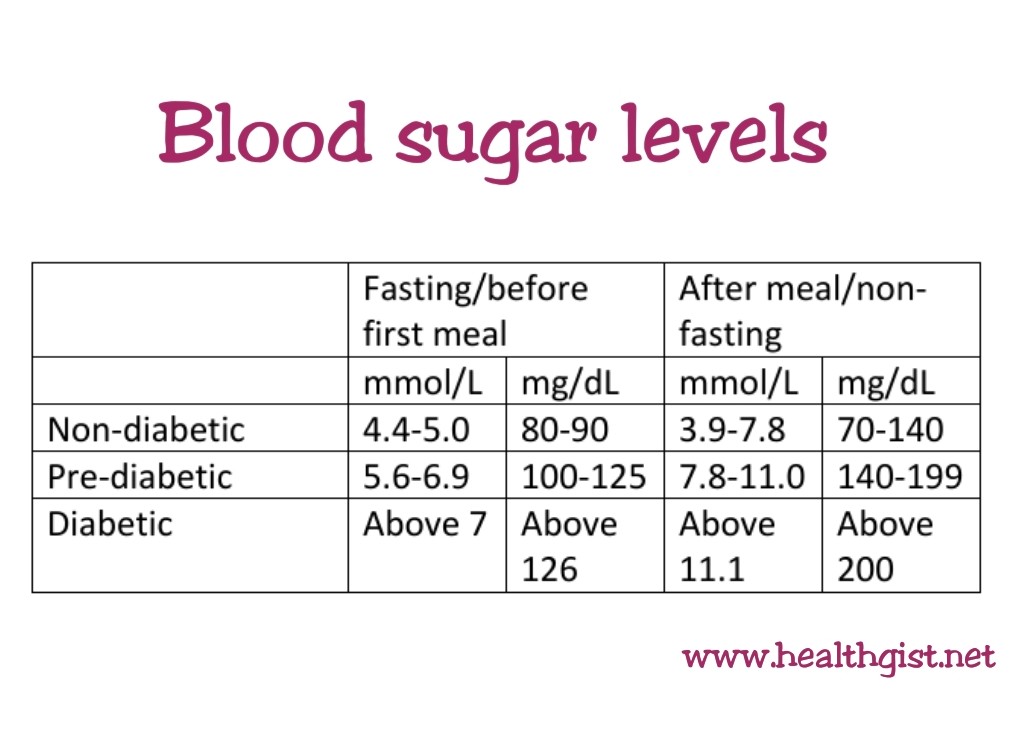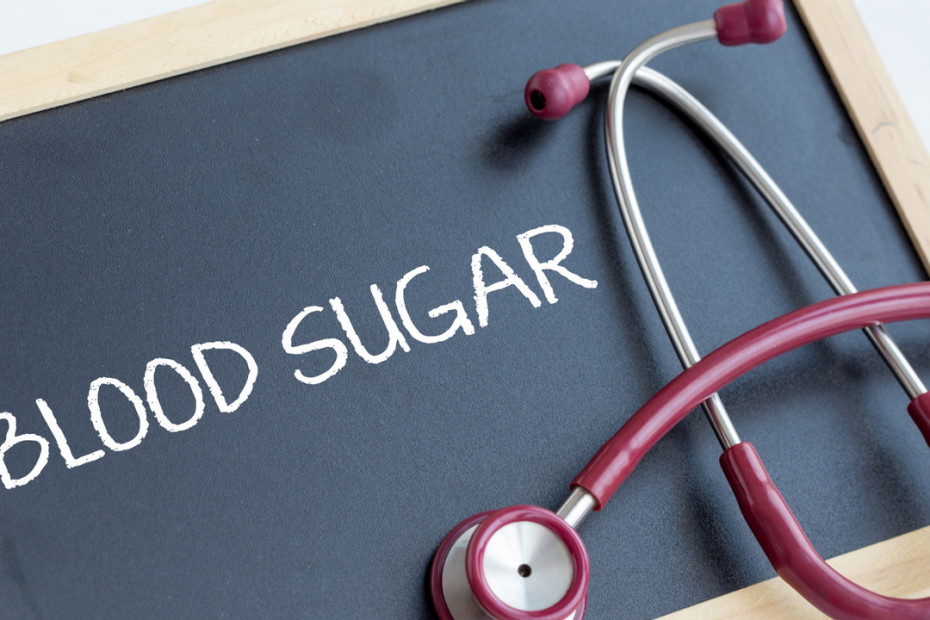As the name implies, blood sugar (also known as blood glucose) is the amount of sugar present in your blood. This sugar is gotten from the food we eat, specifically food high in carbohydrate as carbohydrates contain glucose/sugar. Once the food is digested, your blood carries the sugar from the gut to other parts of the body where it is converted into energy for various metabolic activities.
There is always sugar in the blood, so that even when you haven’t eaten or when you are on a fast, your body still has a supply of energy. Your body regulates your blood sugar levels and there is a normal range that is required for the body to function well and blood sugar outside this range presents some risk. High blood sugar is called hyperglycemia and low blood sugar is hypoglycemia. Blood sugar level is usually low in the morning before your first meal and it may rise above the normal range shortly after meals. Blood sugar is measured in mmol/ L or mg/dL. The table below shows the normal range for blood sugar/glucose.

Blood sugar is regulated by several hormones. When the blood sugar is too high, the hormone insulin helps to reduce it. When the blood sugar level is too low, hormones such as glucagon, catecholamine and cortisol helps to increase it. There are several reactions and pathways involved in these processes. An abnormality in the function of these hormones, for instance if the body fails to produce them, affects the blood sugar level negatively and these could have adverse effects on the health. As previously stated, when the blood glucose level is too high, this is termed hyperglycemia and when it’s too low, it’s termed hypoglycemia. We shall look at the effects of these on one’s health.
Effects of hyperglycemia

As beneficial as glucose is, it can cause damage to the body’s organs when it is too high. Hyperglycemia has to do with problem in insulin production, the hormone that helps to reduce blood sugar level. This happens when there is little insulin in the body due to damage to the organ producing it ( the pancreas) or when the body is unable to use the insulin produced and the causes for these can include surgical trauma to the pancreas, diseases like cystic fibrosis (an inherited condition that can cause digestive and respiratory problems), pancreatitis ( inflammation of the pancreas), pancreatic cancer, Cushing’s syndrome (a condition caused by high levels of cortisol, one of the hormones that increases blood sugar in the blood), and medications like steroids.
Also, high sugar levels might be seen in some pregnant women. This is known as gestational diabetes and it happens due to the reduced sensitivity to insulin ( the hormone that helps to reduce sugar levels). Hyperglycemia can cause the following:
– Increased thirst
– Headache
– Blurred vision
– Weakened immune system
– Fatigue
– Stroke
– Erectile dysfunction
– Nerve damage, initially causing paresthesia and finally loss of sensation to the affected area
– Kidney failure
– Heart attack
– Eye problems
– It can also lead to hyperglycemic crisis which can be fatal
Effects of hypoglycemia

Since our blood sugar is mainly gotten from the food we eat, low blood sugar can be seen in people who are starving or people who are acutely ill but it is most commonly seen in diabetic patients who take too much insulin or diabetic medications or who fail to eat when taking medications. So you shouldn’t have hypoglycemia if you don’t belong to these categories unless you have an underlying health condition that affects how blood sugar is being produced and regulated in the body. Medications such as aspirin and excessive consumption of alcohol can contribute to hypoglycemia. The effect of hypoglycemia on each individual can be different but in general, hypoglycemia can have the following effects on the body:
– Dizziness
– Shaking and twitching
– Lethargy
– Hunger pangs
– Chills and cold/damp palms
– Feeling severely weak
– Getting irritable easily
– Blurred vision
– Anxiety accompanied with a fast or irregular heartbeat
– Feeling confused or not being able to think well due to lack of glucose supply to the brain
– In severe cases, hypoglycemia can lead to loss of consciousness and seizure.
 In light of all these, how then do you maintain a healthy blood sugar level?
In light of all these, how then do you maintain a healthy blood sugar level?
The most important thing is to maintain a healthy lifestyle. This cannot be overemphasized. Also, if you are hyperglycemic, consider doing the following:
– You might need to change your diet, especially by cutting low on carbohydrates.
– Stay adequately hydrated
– Exercise. This can help reduce blood sugar but discuss with your doctor to know the exercise plan that can be effective for you as prolonged exercise can have a negative effect on your blood sugar level.
– Know your stress triggers and avoid them as stress can elevate blood sugar levels.
– Most importantly see your doctor
If you are hypoglycemic:
– Take calorie rich drinks. Check the body of the container to see the calorie content.
– Take glucose whether in liquid, tablet or powdered forms. People with diabetes or hypoglycemia can take dextrose tablets when their blood sugar gets too low
– Eat food rich in carbohydrates in moderate portions as too large portions can cause a spike in your sugar levels. Eat foods that contains simple carbohydrates e.g. white bread instead of complex carbohydrates e.g. wheat. Although ideally, complex carbohydrates are more healthy than simple carbohydrates, well that’s because complex carbohydrates take longer to digest, this helps in maintaining a healthy weight and they do not raise blood sugar levels as much as simple carbohydrates do. This makes them the right choice of carbohydrates for people with diabetes. But in hypoglycemia what you need is a quick rise in your sugar levels and this makes simple carbohydrates the better option.
If an individual is severely hypoglycemic e.g. loses consciousness, medications like glucagon may be required.

Oyewole Ibukun is currently a Medical student of Olabisi Onabanjo University. She has a passion for seeking knowledge with a creative, detail oriented and analytical mindset.

